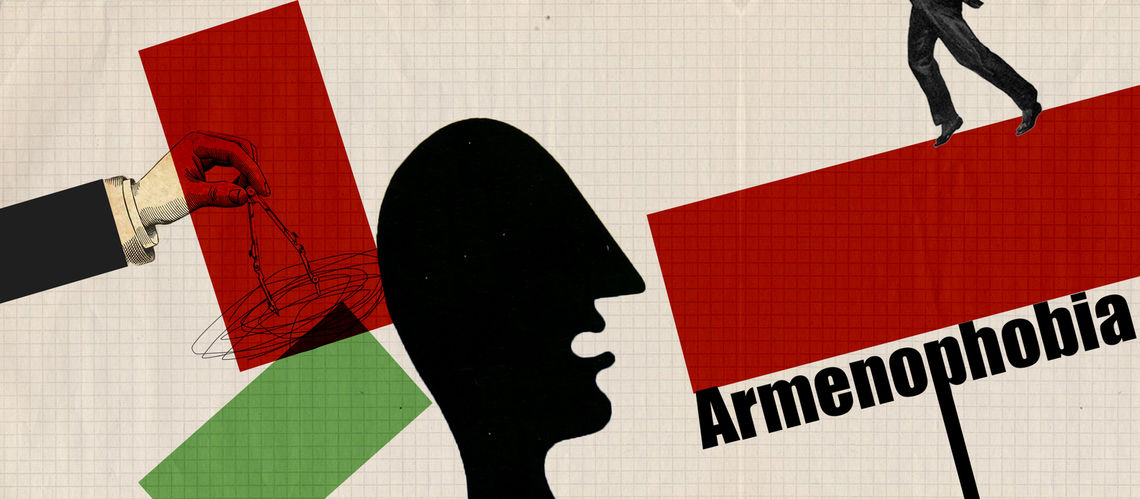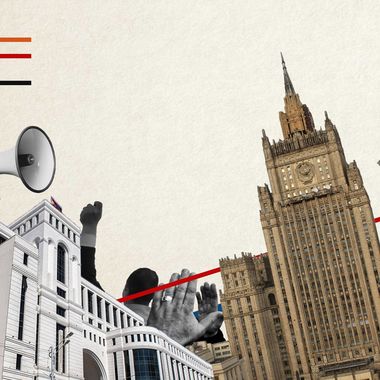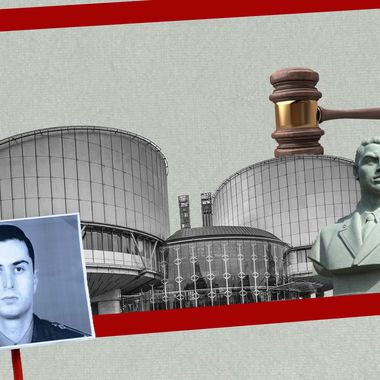
The nationalism of the Aliyev regime suffers from chronic pettiness, a self-realization that its banality breeds an artificial eulogization of historical relevance. Limited in historic values that give substance to a society’s conceptualization of its national spirit, the Azeri[1] ethos faces a profound dilemma: its nationalism is defined by its emptiness [in this article “Azeri” is a specific reference to the Azeri Turkic people that comprise approximately 90% of Azerbaijan, while “Azerbaijani” refers to citizens of the state of Azerbaijan - Editor]. This vacuity in its collective consciousness not only suffocates a desire for historical pride, but it also delimits the re-articulation of a modern nationalism.
The scholarly literature notes the conflict in post-Soviet Azerbaijan between Sovietized and emerging identities, giving way to diverging conceptions of culture, identity, ethnicity, and nationality.[2] To fill this void, modern Azerbaijan, under the autocratic leadership of Ilham Aliyev, has doubled down on this emptiness. Lacking its “own” language, alphabet, historical “glory” or exclusive ethnic identity,[3] Aliyev’s Azerbaijan has sought to fabricate an alternative historical and national identity. This fabrication, however, is not the recreation of a new identity, but rather, the negation and absorption of another’s—that of the Armenians. The Azeri nationalism of Aliyev is not so much defined by Azeri-ness as it is defined by it’s anti-Armenianness. Its logic of Armenophobia,[4] then, is not simply an exercise in cultural, racial, and political chauvinism; it is also a necessary precondition of Azeri nationalism.
How has the Aliyev government gone about doing this? It has done so by relying on historical revisionism and promoting a state ideology that embraces the nonsensical. It has attempted to erase and destroy Armenian history in its territories to argue that Armenians never lived on these lands. It made a mockery of itself among the global academic world by claiming that the Azeris are the descendants of the Caucasian Albanians, thus seeking to provide historical substance to the Azeri identity. It has absurdly claimed that the Azeris were the first Christian people of the region, but they in fact converted to Islam only in recent history. It has thrown tantrums when maps of history do not show an “ancient” Azerbaijan. It has destroyed Armenian iconography in an illogical attempt to demonstrate that Armenian language and art never existed. It has internationally proclaimed that not only the Republic of Armenia, but all Armenians of the world are enemies of Azerbaijan, thus qualifying the innate racism of its state policy. It has, in its totality, basically claimed that everything Armenian is actually Azeri. In essence, it has attempted to recreate a culture and history that simply does not make sense… not even to its own people!
But why is modern Azerbaijan doing this? Why is Aliyev humiliating Azerbaijan in front of the learned world and why has he demanded that the nonsensical become state policy? Because nothingness is more terrifying. And herein lies the paradox. To escape its own emptiness, its own collective ontology of desolateness, Azeri nationalism has sought to embrace the culture, history and values of the Armenian. But this embrace requires an act of nihilism: they must kill the author and plagiarize the book. The erasure of the Armenian legacy requires its Azerbaijanization. In this context, anti-Armenianness is a prerequisite for the structuration of post-Soviet Azeri nationalism. Armenophobia is the one dominant concept that nourishes Aliyev’s otherwise empty and malnourished nationalism.
This article in no way suggests that the values, identities or histories of one people (the Armenians) is superior or better to that of another (the Azeris). But the fact remains that these are the precise terms under which Armenophobia has been cultivated by Aliyev and Azerbaijan’s faux “intelligentsia.” A coordinated state policy, the contours of Armenophobia presuppose the dehumanization of an entire people, where hatred and aversion towards an Armenian is embedded in Azerbaijan’s political culture, where disdain for all things Armenian is normalized, where degradation of the Armenian is glorified, and where, in its public discourse, the lowest and most reviled thing that anyone can be is an Armenian. It is this modality of indoctrination that allows a society, among other things, to venerate a cowardly axe-murderer, to celebrate the shelling of civilian populations and to viscerally mobilize into spontaneous protests calling for war and death to Armenians.
That this is an aporia surprises no one: Azerbaijan’s elite are projecting their own sense of insecurity. Knowing and accepting that post-Soviet Azeri nationalism struggled with substance and authenticity, and facing the humiliation of defeat at the hands of the Armenians,[5] the Azeri political leadership found itself asphyxiated by an inability to articulate a national ethos. Hateful and bitter of the Armenian, a phantom had to be constructed to appease this insecurity: the Armenian as a monster, and the subsequent need to dehumanize this monster. The end result was the distinct formulation of Azeri Armenophobia, qualified specifically in grievances against the Armenian people, and normalized as part of mainstream Azeri political culture. Temporally, the development of Armenophobia as state policy remains specific to the Ilham Aliyev regime. While anti-Armenian sentiments were fairly common prior to his administration in Azerbaijan,[6] these were neither systemic, part of state policy, nor methodically entrenched in its political culture. In this context, Azeri Armenophobia is a distinct articulation of the Aliyev regime and an inherent component of its nationalism. Elements of Armenophobia are codified in the laws of Azerbaijan, while precepts of anti-Armenianness are institutionalized in every facet of Azeri society, from education, to media, to basic social discourse. For this regime, and for this form of nationalism, to be Azerbaijani is to be Armenophobic.
Conceptually, an important question presents itself: Why is the Azeri nationalism of the Aliyev regime qualified as empty? A concept, such as nationalism, cannot be finite. It must have substance and authenticity, and most importantly, it must be qualified and justified in and of itself. Thus, in order for a concept to have substance, it must stand on its own legs and fundamentally possess deontological justification. In this context, contemporary Azerbaijani nationalism is qualified as “empty” because it is not defined by its own substance, but rather, by its opposite. It is not defined deontologically, but rather, by its negation. Simply put, it is not defined by its Azeriness, but rather, by its anti-Armenianness.
A concept of emptiness cannot be self-reflective, for there is nothing to reflect upon. Thus, the empty seeks to define itself through its opposite: the external. Armenia is the external to the emptiness of Azeri nationalism. Without the Armenian, however, Azeri nationalism collapses on its face. To satisfy this ideational void, the Azeri elite simply decided to hijack the Armenian and remold it as their own national daemon. Lacking Geist, and in desperate need of a national spirit, these autocrats did what autocrats do best: cheat. They concocted a state ideology that not only lies to its own people about their very identity, culture and history, but to deflect from this lie, they had to demonize the Other: the Armenian.
The emptiness of contemporary Azerbaijan’s nationalism is a cynical dive into the dialectical, a frantic need for self-legitimization, a desperate desire for authenticity and a clear recognition of the Aliyev regime’s ideological impotence. The poverty of its national ethos has led to an intellectual famine, a scarcity in intellection that has birthed a hunger for ideas. This hunger, of course, has been satisfied by absorbing the Armenian. The Armenian, to the political Azeri, is the archetype of historic and national substance. And Azeri nationalism precisely seeks to steal this archetype. It is no wonder that every conception of contemporary Azeri nationalistic value is defined by its negation: the absorption and alienation of the Armenian as historic and ontological reality.
also read
The Limits of Turkish-Azerbaijani Policies Against Armenia
By Vahram Ter-Matevosyan
The flare-up of violence on the Armenia-Azerbaijan state border triggered a chain of reactions in Azerbaijan and Turkey. Historian Vahram Ter-Matevosyan examines the domestic situation in Azerbaijan and the implications of Turkish involvement.
Roadblocks to a Nagorno Karabakh Settlement
By Anna Ohanyan
Russian Foreign Affairs Minister Sergey Lavrov’s recent statement regarding a step-by-step approach to resolving the Nagorno Karabakh conflict reflects Russia’s centuries-old imperial instincts of using divide-and-conquer tactics on its periphery.
ECHR Chamber Judgment Holds Azerbaijan Accountable, But Falls Short
By Maria Titizian , Lusine Sargsyan
In a Chamber judgment, the ECHR has found Azerbaijan in violation of two articles of the European Convention on Human Rights in the gruesome 2004 murder of Lieutenant Gurgen Margaryan.
---------------------------







EVN Report welcomes comments that contribute to a healthy discussion and spur an informed debate. All comments will be moderated, thereby any post that includes hate speech, profanity or personal attacks will not be published.